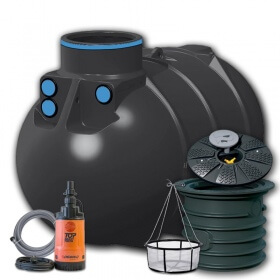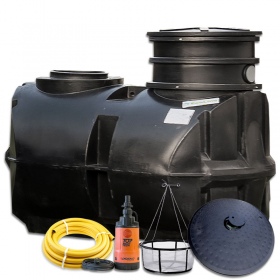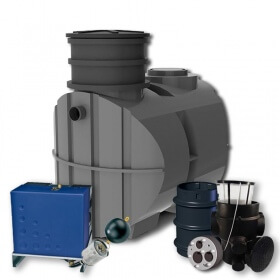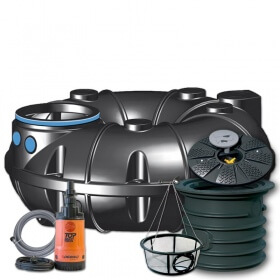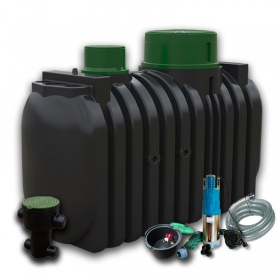- today
- label NEWS
- favorite 0 likes
- remove_red_eye 69960 views
- comment 7 comments

Rainwater tank, and water law and construction law 2021
Rainwater retention and its use for personal use are currently very popular activities. No wonder, since they bring not only economic effects, but above all save the dwindling water resources. More and more often, we can use subsidies offered by municipalities or the government program Moja Woda. Below you will find information on how to install a rainwater tank in accordance with the law.
Construction law
In Poland, there is still no clear legislation on rainwater collection and use those systems. According to the construction law, there are two possible ways: notification or permit. Of course, the notification is simpler and more economically advantageous, and in the construction law we can find a list of cases in which such a solution applies. Unfortunately, on this list there are no water tanks other than a garden pond. This suggests that rainwater tanks may require a building permit.
Due to this gap and ambiguity of regulations, each investment should be consulted with the nearest Poviat Starosty. This is supported by various decisions of the Courts which decide on the issue of construction and installation of rainwater tanks.
A good example of this is the situation in 2017, when the Supreme Administrative Court decided that a building permit is required for a rainwater tank. And two years later, in 2019 in Wrocław, it was decided that in the case of rainwater tanks with a capacity of up to 10 m3, due to the similarity to drainless tanks for liquid waste (septic tank), the construction application itself is sufficient. As you can see, decisions can be made locally and to our advantage.
If you want to retain rainwater, you should also take into account the moment when a rainwater tank is created on our plot. If this happens during the construction of the house, the rainwater tank does not require a separate permit. The notification itself is enough. Another situation occurs when the rainwater tank is to appear on an already built-up property. Then it is necessary to obtain information on the manner in which (notification or building permit) we should report the rainwater tank to the starosty or building supervision.
The problem with the ambiguity of legal regulations concerning rainwater tanks has already been signaled many times. The Minister of Climate and Environment himself indicated that "due to the key role of the above-mentioned facilities to support the so-called small retention, including the development of home installations for rainwater, a decision was made to clarify the current legal status ”. The currently pending draft includes a proposal to amend the building law, excluding rainwater and meltwater septic tanks with a capacity of up to 10m3 from the need to obtain a building permit.
To sum up - taking into account the ambiguity of legal regulations and the variety of decisions of the Administrative Courts (the cases of rainwater tanks were resolved with both the order and the exemption from obtaining a building permit), it is recommended that each investment, such as rainwater tanks, be consulted with the nearest City Hall or Poviat Starosty and compliance with the recommendations obtained there.
Water law
The issue of rainwater (previously treated as sewage) in the legal regulations changed with the Water Law Act on July 20, 2017 (Journal of Laws of 2017, item 1566). Currently, rainwater or meltwater is understood as water resulting from precipitation.
In the case of the water law, similarly to the construction law - there are two possible ways of proceeding, i.e. notification and a water permit. The regulations of the water law also do not clearly define whether a water permit is required in the case of a rainwater tank.
For the sake of clarity, rainwater tanks should be divided into above-ground and underground. In the case of the former, the procedure is simple. Their installation does not require construction works or a water permit.
Due to the frequently emerging doubts as to the clarity of the provisions of the water law, it is worth contacting the Management of the catchment area closest to the target investment site.
Related products
Garden set Standard with Blueline II tank
- Complete rainwater tank with pump and filter
- Top Multi Tech 2 submersible pumps
- Tank capacity from 2,600l to 10,000l
Garden set Standard with Ecoline II tank
- Rainwater set with automatic pump and filter and collection in the lid
- Reinforced construction of the Ecoline II rainwater storage tank
- Capacities from 1700l to 10000l
Home and garden set Standard Ecoline II
- Aquamatic Domestic C Plus air handling unit
- Maxi filter - 350m2 roof
- Tank capacities from 3400 l to 10000 l
- Reinforced construction ECOLINE II PLUS
Standard garden system with Neo tank
- NEO rainwater system
- Top Multi Tech II submersible pumps
- Volume from 1500l to 10.000L
Water rain drop garden system
- Complete rainwater management system for watering the garden
- Fully automatic pump
- Tank capacity 2000l, 3000l, 4000l, 5000l
Comments (7)
-
Czekam już rok na zmianę w prawie budowlanym. Pragnę zbierać wody opadowe do podlewania ogródka ale ministrowie jakoś nie spieszą się aby zmienić prawo. Po co więc dofinansowanie z WFOŚ i GW jeżeli pozwolenia przewyższają koszty. Dużo się mówi o oszczędzaniu wody a nic w tym kierunku się nie robi.
-
Czekam już rok na zmianę w prawie budowlanym. Pragnę zbierać wody opadowe do podlewania ogródka ale ministrowie jakoś nie spieszą się aby zmienić prawo. Po co więc dofinansowanie z WFOŚ i GW jeżeli pozwolenia przewyższają koszty. Dużo się mówi o oszczędzaniu wody a nic w tym kierunku się nie robi.
-
Jestem w tej samej sytuacji co Katarzyna. W mojej gminie wymagają pozwolenia a w sąsiedniej już nie. Wielka kampania w TV a w Sejmie przez 2 lata nie potrafią przyjąć prostej ustawy. Fakt teraz uchodźcy są garacym tematem o suszy przypomną sobie w przyszłym roku w wakacje.
-
Mamy taki beznadziejny rząd gdzie ciężko o drobną zmianę w zakresie zbiorników na deszczówkę w ramach przeciwdziałania skutkom powodzi, a łatwo przeforsować PISany na kolanie nowy ład wprowadzający nowe daniny do PISIORÓW co by utrzymać się przy korycie jeszcze z rok czy dwa lata.
-
Czy są dane na temat ilości złożonych wniosków o dotację z Moja Woda ? oraz ile z tych wniosków zostało pozytywnie rozpatrzonych ?
-
Wysoki rangą pracownik Urzędu Wojewódzkiego uważa, że przy takiej inwestycji nie ma potrzeby powiadamiania organu, powołując się, mianowicie art. 29 ust. 4 pkt. 3d "Nie wymaga decyzji o pozwoleniu na budowę oraz zgłoszenia, o którym mowa w art. 30, wykonanie robót budowlanych polegających na instalowaniu wewnątrz i na zewnątrz użytkowanego budynku instalacji, z wyłączeniem instalacji gazowych" Myślę, że przytoczony art. w 100 % pasuje do zakresu robót budowlanych, polegających na budowie zbiornika. Powodzenia
-
Rysiek, zbiornik to nie instalacja. Instalacją są przewody.

